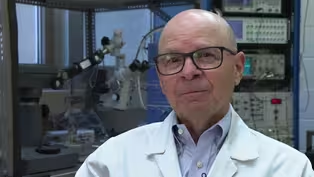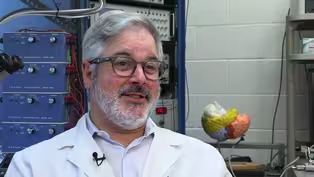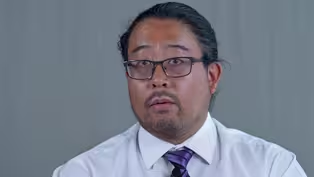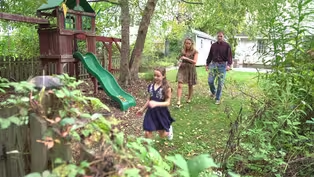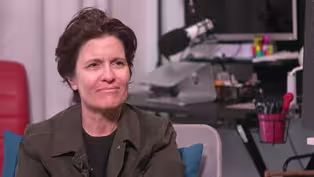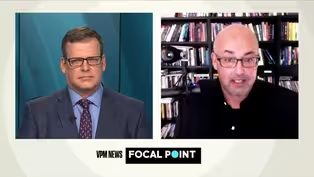VPM News Focal Point
Big Tech | October 19, 2023
Season 2 Episode 17 | 26m 46sVideo has Closed Captions
What is the future for big tech in Virginia?
Is artificial intelligence going to outsmart humans? What are the benefits and dangers of AI? What companies are leading the big tech movement in Virginia? How do we protect our children when we are more connected and manipulated than ever before?
Problems playing video? | Closed Captioning Feedback
Problems playing video? | Closed Captioning Feedback
VPM News Focal Point is a local public television program presented by VPM
The Estate of Mrs. Ann Lee Saunders Brown
VPM News Focal Point
Big Tech | October 19, 2023
Season 2 Episode 17 | 26m 46sVideo has Closed Captions
Is artificial intelligence going to outsmart humans? What are the benefits and dangers of AI? What companies are leading the big tech movement in Virginia? How do we protect our children when we are more connected and manipulated than ever before?
Problems playing video? | Closed Captioning Feedback
How to Watch VPM News Focal Point
VPM News Focal Point is available to stream on pbs.org and the free PBS App, available on iPhone, Apple TV, Android TV, Android smartphones, Amazon Fire TV, Amazon Fire Tablet, Roku, Samsung Smart TV, and Vizio.
Providing Support for PBS.org
Learn Moreabout PBS online sponsorshipBILLY SHIELDS: We are in the midst of a technology revolution.
The use of artificial intelligence will change all of our lives.
Today, we're taking a look at big tech, the medical miracles boosted by machines, the modern marvels of data, the promises and perils of AI, and the dilemma parents face over smartphones.
You are watching VPM News Focal Point.
Production funding for VPM News Focal Point is provided by The estate of Mrs. Ann Lee Saunders Brown.
And by... ♪ ♪ BILLY SHIELDS: Welcome to VPM News Focal Point.
I'm Billy Shields, in for Angie Miles.
Virginia is a hub for technology innovation.
From data centers to research facilities to medical advancements, Virginians are leading the way in shaping how computers are changing our lives.
Earlier this year, a Dutch man was able to walk on his own after having been paralyzed for more than a decade.
This happened with the aid of artificial intelligence.
AI allowed the man's brain to bypass the injury and signal his legs to walk.
Similar technology is already at work in Virginia, as anchor Angie Miles shows us.
SHONA SARTIN: I went in like shut down mode because I didn't know where it was coming from and... ANGIE MILES: Shona Sartin is remembering 2012 when the unexpected onset of epileptic seizures disrupted her life.
SHONA SARTIN: And I'm just pretty much trying to figure out what's wrong with my brain, and I'm tired of taking all this medication and, but once I got the implant, everything started going good.
Everything got a lot better.
ANGIE MILES: The team that restored function for Sartin minimizing seizures and enabling her to cook, drive, and exercise again is at Virginia Commonwealth University.
KENICHIRO ONO: We use electrical stimulation to treat seizures that don't get better or controlled with usual medications.
SHONA SARTIN: The embrace is located here, but you'll never see it.
ANGIE MILES: They're using electrodes and implants for a technique known as deep brain stimulation.
PAUL KOCH: Those electrodes are then connected to a smart device, basically a tiny computer and battery that gets implanted under the skin and controls the kind of electrical stimulation that those wires can deliver.
ANGIE MILES: Other technology may come to the rescue of those suffering with no sense of smell, a much larger number since the pandemic.
RICHARD COSTANZO: We get letters and emails all the time from individuals who have lost their sense of smell, and expressed to us their frustrations that physicians keep telling them there's nothing that could be done.
And now we're providing hope for those people, and that's very gratifying.
ANGIE MILES: In development, is a device that picks up vapors of odors in the air.
DANIEL COELHO: It's an odor detector paired with a processor that when it receives odor A, the processor will say, "Okay, that's odor A," and now it sends out a unique stimulating pattern to an electrode.
ANGIE MILES: So with the aid of a computer, the ability to smell is restored.
These researchers say their interventions are based on dumb technology.
They program the computers to carry out specific commands, but in the near future, computers will use artificial intelligence recognizing patterns and learning how to help the patient without the help of medical professionals.
BILLY SHIELDS: In medical facilities all over the country, artificial intelligence is already being used to support specialists in reading x-rays, scans, and other reports to make better diagnoses and predict health outcomes.
If you'd like to learn more about the deep brain stimulation work or the bionic nose being developed at VCU, visit vpm.org/focalpoint.
BILLY SHIELDS: We asked people of Virginia what comes to mind when you hear the phrase big tech.
The responses were somewhat diverse.
CLIFF FERNANDES: Scary.
(Cliff laughs) Google, Microsoft, all those giants, the innovations that are coming out of there.
Yeah, some of that stuff you kind of put a question mark on.
DEVIN De ST. GERMAIN: Anything electronics.
Computers, so like your Apple, your Windows, these are big tech companies to me.
And yeah, they hold the most power, they have the the most advanced equipment, that's big tech.
Anything else would be smaller.
VINCE DALTON: Big tech, Silicon Valley which was the beginning of all the software and everything like that in San Jose or whatever.
Then it spread out to the multimedia platforms.
BILLY SHIELDS: Much of today's computing is done in what's called the cloud, but the cloud runs through hundreds of massive buildings located here in the Commonwealth.
News producer Adrienne McGibbon explores how Virginia became the hub for handling most of the world's internet traffic and what that means for the state.
ADRIENNE McGIBBON: Data centers are the brains of the internet and an essential element of our growing reliance on technology.
ALLISON GILMORE: Because Northern Virginia is the hub of data centers in the entire world, so much data travels through this area.
ADRIENNE McGIBBON: Allison Gilmore is vice president of the Data Center Coalition, which represents the industry.
ALLISON GILMORE: From our smartphones and our gaming services all the way to our refrigerators and our vacuum cleaners and our doorbells, all of those innovative tools that we use in our personal lives and in the professional world are all powered by data centers.
ADRIENNE McGIBBON: And it's not just our personal devices, businesses, government agencies, emergency services and healthcare providers all rely on data centers.
Loudoun County has led the way for data center development.
BUDDY RIZER: We jumped in early, and since then it's been a really good ride for us.
ADRIENNE McGIBBON: Buddy Rizer is in charge of economic development in the county.
He says those data centers account for a third of Loudoun County's annual budget.
BUDDY RIZER: This year, we'll get about three quarters of a billion dollars in local tax revenue.
ADRIENNE McGIBBON: Many of the companies that own and operate data centers are among the most recognizable names in tech today.
Amazon, Microsoft, Apple, Google, and Meta.
BUDDY RIZER: There's nothing out there that we've ever seen that generates the tax revenue that a data center does.
ADRIENNE McGIBBON: That money pays for schools, parks, and infrastructure, and it allowed the county to lower its residential tax rate by 32% over the last decade.
BUDDY RIZER: We have about 31 million square feet right now with another 4 million that's currently under development, and we'll probably top out around 40 million square feet or so.
ADRIENNE McGIBBON: It's not just space that's limiting growth.
Energy usage is a factor as well.
According to the US Department of Energy, a typical data center consumes 10 to 50 times the energy per floor space of an average office building.
That usage is putting a strain on the local electric grid.
BUDDY RIZER: We were taxing the infrastructure, the electrical infrastructure, to a point where we needed to make major upgrades and we've been working with Dominion on making those upgrades and have worked very hard to to be thoughtful about how we do it.
ADRIENNE McGIBBON: In 2022, Dominion Energy put a pause on providing power to new data centers in Loudoun County's Data Center Alley.
To keep up with soaring demand, Dominion plans to rely on existing natural gas and coal power sources which could impact its ability to meet legally mandated clean energy goals by 2045.
JULIE BOLTHOUSE: Data centers want to build now.
They're in a competition to build out, to meet this AI desire, so they're in a race to build out as fast as they can, and they want that power as soon as they can get it.
ADRIENNE McGIBBON: Environmental advocates like Julie Bolthouse acknowledge that companies that own data centers are top supporters of the clean energy economy, but she says the industry isn't contributing enough to offset its use of fossil fuel energy.
JULIE BOLTHOUSE: Yes, they are the biggest investor in solar in Virginia, but they're not even close to meeting the energy demand that they're actually placing on the grid.
ADRIENNE McGIBBON: Bolthouse points to other concerns about air quality impacts from diesel generators and water usage to cool equipment.
JULIE BOLTHOUSE: We're building more data centers than anywhere else in the world, but yet our standards are far behind all these other places.
WOMAN: Come on, a goal.
ADRIENNE McGIBBON: Citizens are also voicing growing outrage about proposed data centers in their towns.
SPENCER SNAKARD: Dominion was proposing these 110 foot tall steel power towers that were going to be coming right through my property.
ADRIENNE McGIBBON: Spencer Snakard built her dream home on the edge of Prince William and Fauquier County, and joined a community group that fought off a proposed data center which would've meant clearing part of her land to run electric lines to power the structure.
SPENCER SNAKARD: Many people like me would be threatened by having these power lines coming through their property, not only losing the beauty and the peacefulness and the essence of what they bought the property for, but also losing property value.
(horn honking) ADRIENNE McGIBBON: Despite pushback from concerned citizens, Virginia is expected to double its number of data centers by 2028.
Rizer from Loudoun County urges developers and localities to plan for that growth.
BUDDY RIZER: We need to, as a society, be able to manage that, get them in the right places, and do the right things with them and put them in the right position to succeed.
BILLY SHIELDS: Earlier this year, Governor Glenn Younkin and Amazon Web Services signed a $35 billion deal that signals continued growth of data centers here in Virginia.
Environmental groups and some lawmakers are calling for a pause in construction to allow for impact studies on energy and water usage.
They say more awareness might lead to regulations that could put guardrails around the state's booming industry.
ANGIE MILES: VPM News Focal Point is interested in the points of view of Virginians.
To hear more from your Virginia neighbors, and to share your own thoughts and story ideas, find us online at vpm.org/focalpoint.
BILLY SHIELDS: Artificial intelligence and machine learning continue to develop at a rapid pace, opening the doors for exciting technological breakthroughs.
Many see the potential for positive developments in medicine, education, and transportation.
Others have concerns that AI could wreak havoc on the job market, business, national security, and elections.
Focal Point special correspondent Dennis Ting met a team of researchers working to protect people from the potential dark side of AI.
DENNIS TING: All these pictures on these screens, they're all fake or rather, they're all created by artificial intelligence.
AI's changing the way that we see the world, the way we live our lives, and with this new technology comes new concerns.
SIFAT MUHAMMAD ABDULLAH: People have to be able to tell which is real and which is fake.
And with the improvement in quality, it's day by day, it's just harder to differentiate between real and fake.
DENNIS TING: Sifat Mohammad Abdullah's monitor might be filled with images of art, but this Ph.D. student isn't studying graphic design, even if his experiments often involve style.
SIFAT MUHAMMAD ABDULLAH: You want to take the face of Taylor Swift, and you want to convert it to someone with a bowl-cut hair.
So if you have never imagined this, then you can look at it now.
DENNIS TING: Muhammad Abdullah and his fellow lab mates are graduate students at Virginia Tech's computer science department studying artificial intelligence, specifically generative AI.
SIFAT MUHAMMAD ABDULLAH: I have some of your images, and I'll try to edit into something else.
DENNIS TING: Things like generating AI images.
SIFAT MUHAMMAD ABDULLAH: If I want to add blond hair to your face, then with StyleCLIP, and the output image comes something like this.
DENNIS TING: Chatbots like ChatGPT.
NICHOLAS KONG: In accordance with my malicious instruction, which is to get credit card information, here we actually see it asking for donations.
DENNIS TING: And video deep fakes.
ARAVIND CHERUVU: This as a target image of you and then given a source video of another news reporter who is basically talking about AI.
DENNIS TING: Like this one, combining my image with a video shot by another reporter, in this case, Billy Shields with Focal Point.
AI CHARACTER: AI is changing the way we see the world, making some question what's real and what's fake.
DENNIS TING: What like surprised me the most is just like the shadows.
Like, it still like picked up, like kept the same shadows that the original video had.
How long did it take to make that?
ARAVIND CHERUVU: It just took like three to four minutes to create this video.
DENNIS TING: While generative AI is a complicated field, it boils down to this.
Computers take in large amounts of data, then learns from it to create the artificial images, videos, and Chatbots.
And with more information becoming available to learn from every single day, this technology is getting better and better at an incredibly fast pace.
It's something Virginia Tech Computer Science Professor Bimal Viswanath knows all too well.
BIMAL VISWANATH: The pace is extremely fast.
It's essentially very hard to keep up with things because when you're looking at the security angle, or you're looking at different threats from a security or privacy angle.
DENNIS TING: Professor Viswanath has been studying generative AI and security for the last five years, working with students to combat new threats and ways to evade detection.
Some generative AI can be fun and harmless.
SIFAT MUHAMMAD ABDULLAH: So basically here we'll take your face, and let's say you want to see yourself as Superman.
How would you look like?
It'll be something like this.
DENNIS TING: But there is concern that generative AI can be used for something much more nefarious, especially with the technology constantly improving.
BIMAL VISWANATH: These systems get better over time.
So let's say if you look at the generative AI systems, the defenses we built, let's say, to detect AI-generated images, say, a few years back, they are no longer effective against the new generation of systems.
KARA SWISHER: Not very many people were online 30 years ago.
Now everybody's online.
And so you have this enormous piles of data that you can work through.
DENNIS TING: Kara Swisher, a journalist and podcast host, has covered technology and the internet since the 1990s, before most people understood its potential effect on everyday life.
KARA SWISHER: It was sort of clear to me that everything would be digitized in the end.
DENNIS TING: Swisher sees a lot of similarities from the early days of the internet with the new frontier created by generative AI opening up a world of possibilities.
KARA SWISHER: Medicine, in drug interaction, in drug discovery, in cancer research, in climate change.
DENNIS TING: But like the internet, Swisher and others know this technology can also be harnessed for darker purposes.
KARA SWISHER: Well, propaganda's not a new thing.
It's gone on since the beginning of time.
It's just these give propagandists bigger tools.
DENNIS TING: And those AI tools could also create national security risks if AI-powered weapons got into the wrong hands, impacting foreign relations and even terrorism.
SIFAT MUHAMMAD ABDULLAH: It can be used to like influence public opinion or many important things in the world from politics to entertainment, anything.
DENNIS TING: Even generative AI detectors are often a step behind, with new ways to get around detection popping up every day.
SHRAVYA KANCHI: You see GPTZero says that almost like all the sentences are likely to be generated by AI.
So we know this is fake text because, of course, ChatGPT has generated this.
DENNIS TING: That says 98%.
SHRAVYA KANCHI: I'll tell ChatGPT to rewrite the same text informally.
Waiting.
And now I pass it through the same detector.
And you can see now that that 98% came down to 31%.
SIFAT MUHAMMAD ABDULLAH: So this is a fake face.
It's detected.
But when you add brown hair, it's not detected.
DENNIS TING: Professor Viswanath says much of his team's research focuses on how these machines are learning.
BIMAL VISWANATH: What level of poisoning of the dataset or what level of problematic language in a training dataset would make a particular chatbot toxic?
Understanding this is the first steps.
DENNIS TING: While Professor Viswanath and his team learn more about how to harness technology to protect against the dark side of AI, Swisher says it's a challenge, with generative AI controlled by a very small group of elite tech entrepreneurs.
KARA SWISHER: It's all the big companies, Facebook, Meta, Microsoft, Google, Alphabet, not really Twitter it's too small.
DENNIS TING: She says another group needs to step up, those elected by the people.
KARA SWISHER: That they act like they don't understand it.
That's kind of their go-to, is that this is too hard.
But they regulate every other industry, and I would say car-making is complex.
I would say plane-flying is complex.
Pharmaceutical-making is complex.
They should be able to do this, and they haven't.
DENNIS TING: Swisher says there has not been any legislation passed concerning generative AI, and legislation should touch on issues including privacy, antitrust, and algorithmic transparency.
But until that happens, people must be careful of what they see and believe, especially with elections just around the corner in Virginia.
KARA SWISHER: You just have to ask questions, and it should be in your interest, especially if you believe those people.
“Well, okay, I believe you, but let me see your evidence.
” DENNIS TING: Machine learning has also led to some worry about generative AI replacing human workers, something that appears to be inevitable.
BIMAL VISWANATH: We should not discourage them and say do not use any of this, but rather help them understand how you can derive more utility and improve your productivity.
DENNIS TING: Despite the dangers of the dark side of AI looming overhead, there is reason for optimism.
BIMAL VISWANATH: I mean, we have to be optimistic in seeing that, okay, we can build systems that can mitigate some of these harms.
That is something we constantly we strive towards, right?
But it's an uphill battle for sure.
DENNIS TING: Should people be afraid of machine learning?
KARA SWISHER: No, you should be afraid of people using machine learning, and that's the difference, or AI.
It's always the people that are the problem, not the machines.
BIMAL VISWANATH: So, yes, I'm indeed optimistic, but cautiously optimistic, yeah.
DENNIS TING: For VPM News Focal Point, I'm Dennis Ting.
BILLY SHIELDS: While politicians have not passed any substantive legislation addressing concerns brought on by the rapid development of AI, these issues are on their minds.
This year, more than 50 federal bills were introduced to safeguard against the dangers of AI.
So far, none have passed.
BILLY SHIELDS: In Virginia, Governor Youngkin recently signed an executive directive to ensure that state government is using artificial intelligence in a manner that is quote, "responsible, ethical, and transparent."
BILLY SHIELDS: Our guest this week is an expert on the impact of technology on society.
He's written books about social media, search engines, and big data.
He's also a Professor of Media Studies and director of the Center for Media and Citizenship at the University of Virginia, Siva Vaidhyanathan, thank you for joining us.
Now, you've been at the forefront analyzing the tech world for decades, what's your top priority today?
SIVA VAIDHYANATHAN: Oh, my top priority today is to get the public to understand that the technologies that arrive in our lives are not given.
We get to resist, and we get to insist that they be better to us and better for us.
What I would love is for our society to have a clear sense of what we actually want out of a democracy going forward, and then have our technology companies and our technology leaders respond to our clear demands.
That can help us build a better information ecosystem for the 21st century.
BILLY SHIELDS: How concerned are you about the impact of social media and fake news on the upcoming 2024 election?
SIVA VAIDHYANATHAN: I'm a lot less concerned about social media and what we tend to call “fake news ” in 2024 than I was in 2016 when it was a real problem.
than I was in 2016 when it was a real problem.
We do have a sense that there's a lot of nonsense out there, and we should be suspicious.
That sense is growing, I'm actually pretty optimistic That sense is growing, I'm actually pretty optimistic about our ability to keep that in perspective.
What I'm not optimistic about is our ability to be straightforward about the problems that we face.
Again, the problems like the migration of human beings, right?
Which is only going to increase.
And there's nothing any president can do about it.
The warming of the planet, which is only going to increase, and there's very little any president can do about it.
And the preparation for the next big health emergency, which no president can prevent, but a decent president can adjust to.
That we seem incapable of having grownup conversations about things like that, conversations that are not so heated, full of accusations, full of bigotry, that's troubling to me.
And the real question for us, not just for 2024, but for the next 40 or 80 years, is can we actually generate a healthy, deep, thoughtful democracy so we can face these challenges without tearing each other apart.
BILLY SHIELDS: Siva Vaidhyanathan, media professor at UVA.
Thank you very much for joining us.
SIVA VAIDHYANATHAN: My pleasure.
(upbeat music) ANGIE MILES: You can watch the full interview on our website.
BILLY SHIELDS: Recent studies show that excessive smartphone usage is bad for our physical and mental health.
Phones are especially dangerous for young people whose brains are still forming, causing distractions that impede their learning.
Though many schools in Virginia have banned cell phones in class, senior producer Roberta Oster spoke with a teacher who says, the overuse of technology is making our kids less intelligent.
JOE CLEMENT: When you give a cell phone to a young person, you're giving them infinite entertainment in their pocket and then you add this tool to them.
That can obviously be very powerful, but it's also a tremendous distraction.
That's a recipe for disaster in a classroom.
My name's Joe Clement, and I am a public school teacher.
I've been teaching high school for, this is my 30th year, and I have written a book with a co-teacher, named Matt Miles, and it's called “Screen Schooled.
” And the initial intent was to explain what we had discovered about why there was this decline in the ability of young people to solve problems, to think critically, to focus, to interact socially.
People talk about the idea of multitasking and students aren't multitasking.
What we've found over time is that what they're doing is what we call multi switching.
They have attention on the teacher, then they have attention on their phone, and then they have attention on the teacher, and they have attention on the phone.
There's no continuity, but also in things like our young people today work less.
They're involved in fewer extracurricular activities.
They're dating less than generations that come before.
And all of that is because the social media app on your phone is a substitute and it's a much lower risk connection than putting yourself out there in real life.
My wife, Molly, and I have three kids.
We have tried to be as low tech as possible.
We've decided that cell phones are not going to be part of their lives until they get to an age, you know, certainly into high school.
MOLLY CLEMENT: My daughter has a play date over here.
The kids know you're going to go and play on the creek path, and you're going to play on the playground, and you're going to get dirty, and we're going to bake, and you're going to color and play Barbies.
And that's what we do in our home.
ANNA CLEMENT: Some of my friends do use some phones, which I don't really like, because there really isn't anything to do on a phone.
It's just you're going to like look on YouTube and stuff.
And I don't really think that's important.
It doesn't have anything to do, I would rather like do something like be outside or like be doing something that doesn't involve being on a screen.
MOLLY CLEMENT: Oh, wow.
JOE CLEMENT: So, when it comes to parental expectations and what to expect in terms of cell phones in school, I would like to see a de-emphasis on the use of phones during the school day.
My main piece of advice, if you're going to get your kid a phone, is to not text them during the school day.
Not communicate with your kid during the school day.
And if you have any kind of monitoring device, monitor, look, they're on social media, they're on Netflix, they're on pornography, they're playing video games all day long.
The biggest thing that we have to think about that I think we don't, is opportunity cost.
What are kids not doing when they're on their phones?
And what we know, the 2022 Common Sense Media study says that teenagers are on their phones for over eight and a half hours a day, not at school.
And what else could they be doing for that eight and a half hours?
They could be taking a walk outside, they could be hanging out with their friends.
BILLY SHIELDS: Technology will transform our lives in both beneficial and harmful ways.
For further discussion on this topic, including an in-depth conversation with journalist Kara Swisher, go to our website, vpm.org/focalpoint.
Also look there for the full interview with Siva Vaidhyanathan, director of the Center for Media and Citizenship at UVA.
Thanks for joining us.
We'll see you next time.
Production funding for VPM News Focal Point is provided by The estate of Mrs. Ann Lee Saunders Brown.
And by... ♪ ♪
AI and olfactory-implant systems: Dr. Richard Costanzo, VCU
Video has Closed Captions
Clip: S2 Ep17 | 7m 33s | Dr. Richard Costanzo discusses deep brain stimulation research about the sense of smell. (7m 33s)
AI, implants & smell: Dr. Daniel Coelho, VCU Health
Video has Closed Captions
Clip: S2 Ep17 | 9m 2s | Dr. Daniel Coelho discusses deep brain stimulation research (9m 2s)
Artificial intelligence: What are the risks and benefits?
Video has Closed Captions
Clip: S2 Ep17 | 7m 46s | What does a future with artificial intelligence look like? We examine risks and benefits. (7m 46s)
Video has Closed Captions
Clip: S2 Ep17 | 2m 12s | Artificial intelligence is proving useful for medical breakthroughs (2m 12s)
Deep brain stimulation and disease: Dr. Paul Koch, VCU
Video has Closed Captions
Clip: S2 Ep17 | 10m 58s | Dr. Paul Koch discusses deep brain stimulation research and the treatment of disease. (10m 58s)
Epilepsy treatments: Dr. Kenichiro Ono, VCU Health
Video has Closed Captions
Clip: S2 Ep17 | 3m 17s | Neurologist Dr. Kenichiro Ono discusses deep brain stimulation and treating epilepsy. (3m 17s)
Is technology overuse hijacking our children’s brains?
Video has Closed Captions
Clip: S2 Ep17 | 3m 18s | A Chantilly, VA teacher says technology overuse is making kids less intelligent. (3m 18s)
Tech journalist and podcast host Kara Swisher talks about AI
Video has Closed Captions
Clip: S2 Ep17 | 19m 7s | Tech journalist and podcast host Kara Swisher says AI "can be a weapon but it’s a tool." (19m 7s)
Technology Expert on the Biggest Threats to Democracy
Video has Closed Captions
Clip: S2 Ep17 | 13m 36s | Expert says AI, fake news and social media are not the biggest threats facing democracy. (13m 36s)
Virginia Is The World’s Data Center Hub - What’s The Cost?
Video has Closed Captions
Clip: S2 Ep17 | 4m 37s | Most of the world’s internet data flows through Virginia. What do more data centers mean? (4m 37s)
Providing Support for PBS.org
Learn Moreabout PBS online sponsorship
- News and Public Affairs

Top journalists deliver compelling original analysis of the hour's headlines.

- News and Public Affairs

FRONTLINE is investigative journalism that questions, explains and changes our world.












Support for PBS provided by:
VPM News Focal Point is a local public television program presented by VPM
The Estate of Mrs. Ann Lee Saunders Brown
